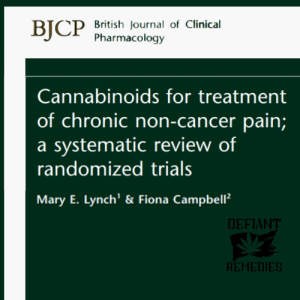Pain Research
Historically, cannabis has been used to treat pain in many cultures. Below we have chronicled some of the scientific evidence studying cannabis and pain. Cannabis itself is a complex substance containing hundreds of cannabinoids, terpenes, and other bioactive chemicals. Additionally, physical pain is a complex and multifaceted experience that can be classified into several distinct types based on its characteristics and underlying causes.
We look forward to more clinical research being published on the topic.

Research
In more recent years, Research into cannabis has demonstrated its effectiveness for treating chronic pain.
The University of Toronto did a systemic reveiw of randomized controlled trials (RCT’s) examining cannabinoids in the treatment of chronic pain. They concluded that fifteen of eighteen trials demonstrated significant analgesic effects with no serious adverse effects.
The review looked at multiple studies where patients with chronic, non-cancer pain (like neuropathic pain, fibromyalgia, and rheumatoid arthritis) were treated with different types of cannabinoids, including smoked cannabis, oral extracts, and synthetic versions like nabilone and dronabinol. Most of these studies found that cannabinoids helped reduce pain more than a placebo did, and many reported better sleep, too. Side effects were generally mild, with few participants dropping out due to issues. The evidence suggests that cannabinoids may be safe and moderately effective, especially for nerve pain, with early promise for conditions like fibromyalgia and arthritis.

In 2017, The National Academies of Sciences, Engineering, and Medicine published their review of 29 randomized trials and concluded that cannabis is an effective treatment for chronic pain among adults.

In a randomized controlled trial looking at Cannabis extracts, (slight pause) a THC only product, a THC/CBD combination product and a placebo were all compared in patients with intractable pain despite opioid treatment. The product containing both THC and CBD proved significantly better than both THC alone and placebo.
This study shows that the combination of THC and CBD can help relieve pain in patients with advanced cancer pain not fully relieved by strong opioids.
A follow up study with these patients concluded that the long-term use of the THC/CBD combination was generally well tolerated, with no loss of effect for the relief of cancer-related pain. Furthermore, patients who kept using the medication did not seek to increase their dose of the cannabis or other pain-relieving medication over time. These are both significant advantages of cannabis compared to using opioid medications alone

Beta-caryophyllene (BCP), found in many spices and plants, is a natural compound that targets the CB2 cannabinoid receptor, which plays a role in managing pain and inflammation.
A 2014 study has shown that BCP can reduce inflammation and pain when taken orally, especially for chronic conditions like neuropathic pain. In animal tests, BCP decreased long-term inflammatory pain but did not affect immediate, short-term pain. It also reduced symptoms of nerve pain without causing the tolerance issues often seen with other treatments. Importantly, BCP proved more effective than some synthetic CB2 activators, potentially due to its stronger natural affinity for the CB2 receptor. As BCP is present in many foods and has low side effects, it may offer a practical, natural option for chronic pain management in humans.

